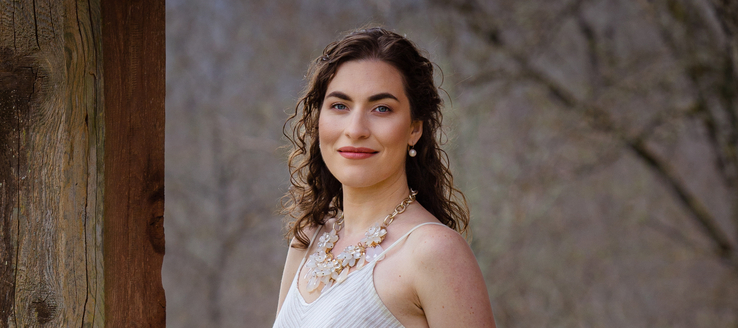Master Research Symposium: ‘What is this thing called 'Chest Voice' by Vizma Zvaigzne
Master students, during their studies, delve into research topics related to their main field of study. At the Master Research Symposium, happening this week, they present their findings, covering a wide array of subjects, accompanied by live music! Click here for the full schedule and the programme.
We had the opportunity to speak to a few students and asked them about their research projects.
One of those student is mezzo-soprano Vizma Zvaigzne. In her research project, Vizma Zvaigzne delves into the female chest voice, aiming to understand its significance and challenges. She explores historical, scientific, and pedagogical perspectives to clarify terminology and strategies for navigating vocal transitions. Through this journey, she hopes to shed light on a crucial aspect of vocal performance and share valuable insights with others in the field.
Hi Vizma! Can you please tell us what your research project is about?
“My research subject is on the female chest voice - the vocal register we all recognize being very close to the natural speaking voice. The research is called "What is this thing called 'Chest Voice´? An overview of historical, scientific and pedagogical perspectives". I tried to find a definition and a deeper understanding of this phenomenon often colloquially referred to as the chest voice. I was also looking for strategies and advice on how to approach the first transition, often called the primo passaggio, and how to smooth that transition from the chest to the mixed register and vice versa.”
Why did you choose this subject?
“Because it has been a very relevant topic in my voice training over the past few years, and it is also a controversial topic - there are people who claim to never use it because they find it vulgar and ugly, there are some who believe that using the chest voice will ruin the rest of your voice and create a hole in it, etc. Of the 14 voice teachers I have had in my life, only 2 have addressed and taught it. But I find it crucial, especially for a lower female voice like mine (I'm a mezzo-soprano), and it has helped me find balance in the whole instrument, my more authentic color of voice, opened up many new possibilities. However, I still had a lot of questions, so I decided to delve into this topic and look at it from different perspectives, both theoretical and practical.”
What was the experience like, researching this?
“It was exciting! So many different views, from teachers of the bel canto era, who mostly perceived and taught singing empirically, to vocologists and the latest research. It was a whole journey that helped me gain new insights, clarify terminology, and learn subtle differences to better communicate my confusion about certain technical aspects of singing with my voice teacher, as well as more easily translate what other people want from me in the work process. Now that I know how to search for and access scientific papers, I have also realized that I can actually read and understand them. As part of my research, I also collected qualitative data by conducting seven semi-structured interviews with voice teachers, which was also exciting and enriching.”
What did you think of the results of your research?
“It taught me how to do research (I didn't have to write a thesis for my bachelor's in Berlin), so I'm grateful for that. But most of all, it made me excited about research and gave me a better understanding of the subject. Both for myself, and it has also improved my vocal performance and the integration and use of the chest register, as well as made me able to explain it to others. The paper also gives a good overview of what we know about the subject, addresses issues of terminology (which in this case is indeed a "semantic minefield" as Scott McCoy has described it), and includes the interviews with 7 voice teachers, all of which can be stimulating, inspiring, and enriching material not only for me, but hopefully for other singers and voice teachers as well.”
Video
Vizma has generously provided us with two accompanying YouTube links that complement her research. Click here for video 1 and Click here for video 2, which provides a bit more context.
Thank you so much Vizma, what a wonderful subject and we're positive that this research is incredibly valuable, not only for your own career, but to everyone!
